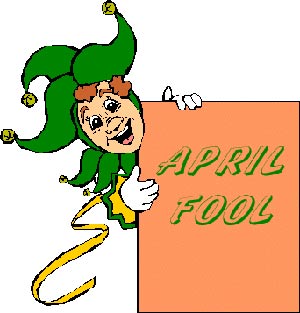西方的民间传统节日愚人节就要到了。在这一天里,所有的事实和假设都看起来那么可疑。你听到:“开会了”,或“我请你吃饭”,甚至“我爱你”,都要将信将疑地问一句:是真的吗?否则,结果很有可能让你大感意外。那么,愚人节是怎么来的呢?谁又是历史上第一个被愚弄的人呢?
Who Were the First April Fools?
We know that April Fool's Day, a worldwide celebration of pranks and hoaxes, was around before 1539, when the earliest clear reference appears in a Flemish manuscript. Beyond that, we're not really sure. Theories on the origins of the goofy celebration abound—but, then again, they could be hoaxes themselves.
The French?
The most popular theory attributes the day to 16th-century France. When King Charles IX moved New Year's from the end of March to Jan. 1, those who kept celebrating in spring were mocked and called fools. Another theory ties the tradition to the ease with which newly hatched fish could be caught in early April. Fooling people on April 1 became a way of celebrating the abundance of "foolish" fish. The French still call April Fool's pranks Poisson d'Avril, or April Fish.
The Germans?

An important meeting of German lawmakers in Augsburg was scheduled for April 1, 1530, but was canceled. Some citizens had wagered that the meeting would occur; they lost their money and were mocked for their foolishness, setting off the tradition of joking on the first of April.
The British?
British legend traces the celebration to a town called Gotham. Residents prevented the king from passing through town because any road he traveled became public property. The king sent his Army to punish them, but the soldiers found the citizens behaving like lunatics. The clever townspeople were only putting on an act, but the king decided they were too foolish to be punished.
The Dutch?
The Dutch gained their independence from Spain after nearly a century of war. In one critical battle on April 1, 1572, Dutch rebels captured the town of Den Briel. They began commemorating the humiliation of the Spanish forces with a tradition of pulling pranks on the anniversary of the battle.
The Romans?
When Constantine ruled the Roman Empire, a group of jesters persuaded him to make one of their own king for a day. Constantine agreed and made a fool, called Kugel, king on April 1. During his brief reign, the jester proclaimed that the day would be one of absurdities and hoaxes, hence the origins of the celebration. note: this theory was itself an April Fool's day hoax by Boston university professor Joseph Boskin in 1983. He fooled an associated press reporter into believing it, and the story was published widely before the news organization realized its mistake.
(Agencies)
相关阅读
愚人节:办公室恶作剧有助于缓解压力
希拉里开愚人节玩笑 欲与奥巴马比试保龄
病毒今日爆发 愚人还是害人
媒体愚人节“十大经典恶搞新闻”
(中国日报网英语点津 编辑:Julie)